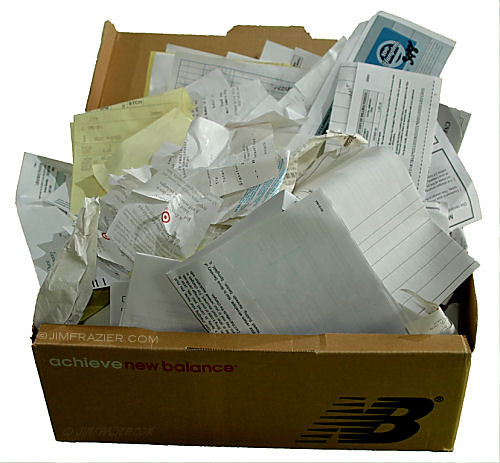
It's generally required that sellers get certificates from their customers to make sure they really are buying something for resale, or there's some other reason that they don't have to pay sales tax.
But I want you to think about reversing the situation.
I want you to start asking your vendors, who are charging you sales or use tax, for proof that they are registered in your state. Huh?
Whether this is a problem in your state is a function of how the laws are written, where the responsibilities lie, and how sharp the auditors are. So if you don't want to take my advice, that's fine. Just make sure that you
know you're off the hook.
Let's say that Mary has just shipped you some new ladders from the "land of ladders," Wyoming.
Mary has charged you 6% tax, which is also the rate in your state, oh, Maine. [I'm just making the states up as I go along, folks.]
Any reason not to pay this?
The answer is
yes!
If you received the goods in Maine, then Maine tax applies. How do you know that Mary is collecting Maine tax? After all, she's far away in Wyoming.
"Well, they're charging me the Maine rate. I've got a calculator right here."
The average rates in the US range from about 5 to 9%. This means there's a chance that someone shipping from out of state is going to be charging your tax rate, without any assurance that your state is getting the money.
There's an easy solution. Call the vendor (Mary) and ask her a two part question. First, what state's tax is she charging? You may be amazed at how often her response is, "We're charging Wyoming's tax. What tax did you think we were charging?" If that's her response, then please refer Mary to this
blog. And don't pay her the tax. Pay it directly to Maine as use tax.
Alternatively, Mary may respond, "Let's see. You're in Maine. Yep, we're charging you Maine tax." You may think that solves the problem. But you should ask the second question.
"Can you send me a copy of your Maine reseller permit please?"
"What do you mean?"
"Well, if you're charging Maine tax, then you must be registered in Maine to remit that tax properly. We like to make sure of that, so please send me a copy of your permit. You can fax it if you'd like."
"Uh, we're not registered in Maine."
"Then what did you mean when you said you were collecting Maine tax?"
"Oh, we just look up the rate on the web and charge you that. But we send the money to Wyoming."
Hand on my heart, I've heard a variation on that story quite a few times. I couldn't make it up.
Again, tell Mary about this blog. Please. And don't pay her the tax. Pay it directly to Maine as use tax.
Why do you care what tax is charged?The first answer is universal. Does your state have budget problems? Wouldn't you prefer that any taxes you pay go to the appropriate state, like yours? Asking those questions makes sure Maine gets the money instead of those guys in Wyoming.
The second answer brings up a nastier and more painful possibility. If you get audited, and the auditor comes across the invoice from Mary in Wyoming, and he does a particular test, he'll discover that Mary isn't registered in Maine. That means Maine never got any tax revenue. Which means that Maine will make
you pay that money
again - to Maine. And good luck getting that money back from Mary in Wyoming.
The test that the auditor runs is to take some of your out of state vendors who have charged tax, and simply check to see if they're in the state's registered vendor database. If they're not in the database, there's gonna be trouble.
But you can do essentially the same test by simply getting the permit from any of these types of vendors. And if you can show the auditor that you're doing that check, they will probably be seriously impressed. Which is nice.
Here's the action item:
Whenever you are charged tax in a significant amount by a vendor shipping from out of state, get a copy of their registration permit for the delivery state.I don't normally recommend you do this for vendors that are
in your state. Your risk is pretty small. But
tomorrow I'll tell you about one case where it made sense to check.Finally, a question that comes up is "What if they put the state on the invoice next to the tax? Doesn't that show they're really charging Maine tax properly?" Nope. You want to see the permit. That's
another story!
The Sales Tax Guy
http://salestaxguy.blogspot.comSee the disclaimer - this is for education only. Research these issues thoroughly before making decisions.
Here's information on our upcoming seminars and webinars. Don't forget, we just announced our February to April schedule!
http://www.salestax-usetax.com/












